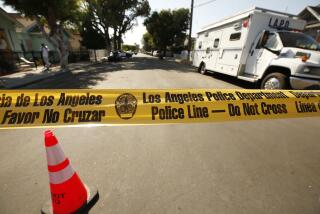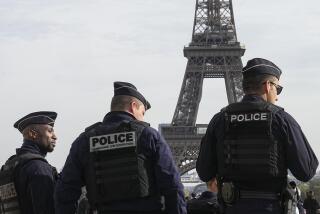City Employee Booklets Draw Criticism
- Share via
Local law enforcement officials coordinating security for the Democratic National Convention issued booklets to Los Angeles city employees this week listing all the hotels where hundreds of delegates are staying and tidbits on how to deal with such issues as bomb threats, suspicious packages and tear gas exposure.
“Our role in the DNC 2000 is to ensure a safe and orderly environment for this historic event,” Mayor Richard Riordan wrote to employees in one version of the pamphlet. “This challenge provides us with the opportunity to demonstrate our professionalism while excelling at all levels.”
But some City Hall insiders said they were alarmed to find that tear gas exposure was casually mentioned, along with common health hazards like sunburns and heat cramps. For weeks, city officials have expressed concern that police and protesters will engage in violent clashes during the convention.
“It’s like, ‘Welcome to L.A., bring your gas mask,’ ” said one official.
Councilman Mark Ridley-Thomas also questioned the wisdom of listing the delegates’ hotels.
“Why on one hand do you give instructions about tear gas and on the other hand you blatantly publicize where delegates will be housed?” Ridley-Thomas said. “It doesn’t really demonstrate a sophistication with respect to a security plan, does it?”
The Democratic National Convention Planning Group--headed by the Los Angeles Police Department--handed out two versions of the booklet, one for sworn officers and the other for civilians.
The police version includes a section on the problems the “anarchists” caused during the 1999 World Trade Organization meeting in Seattle and an overview of mass arrest procedures.
Officers are also urged to bring an extra uniform “in case of extended deployment to a DNC-related incident.”
LAPD Cmdr. David Kalish, a department spokesman, said the booklets were intended as “informational material for concerned representatives” of the city.
“If people get asked questions by delegates or visitors, they will have the information,” Kalish said. “They’ll also have the information that is relative to their own situations.”
More to Read
Get the L.A. Times Politics newsletter
Deeply reported insights into legislation, politics and policy from Sacramento, Washington and beyond. In your inbox twice per week.
You may occasionally receive promotional content from the Los Angeles Times.










